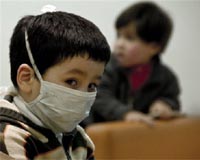| . |  |
. |
Riyadh (AFP) June 18, 2009 Saudi Arabia is gearing up for a possible outbreak of swine flu among millions of Muslim pilgrims this year as four new cases were detected in the holy cities of Mecca and Medina this week, the health ministry said. Three Saudi children in Medina were diagnosed with the H1N1 virus, the ministry said on Thursday, while a nine-year-old Malaysian boy was found infected in a hotel near Mecca's Grand Mosque on Wednesday. Nationwide, 12 new cases have been announced over the two-day period, taking the total to 29 since the virus first appeared on June 3. The case underscored the threat of an outbreak among the more than two million Muslims expected to arrive from around the world during the August-December pilgrimage season, ministry spokesman Khaled Marghlani said. The host to Islam's two holiest sites, Mecca and Medina, the government is already working with the World Health Organisation and other international bodies to finalise a plan for dealing with the threat, Marghlani told AFP on Wednesday. "The whole world is worried about it," he said. "We are trying very hard. The people coming here are guests of Allah." The ministry has stockpiled doses of the antiviral medication Tamiflu equivalent to 10 percent of the country's 25.3 million population, he said. Commercial pharmacies have been reporting heavy sales of the drug as well amid rising public concern, according to media reports. Tamiflu is effective in treating swine flu in its early stages. Before the Malaysian boy's case, members of a Mauritanian family visiting Medina from Canada were diganosed with A(H1N1), underscoring the threat that already exists from the thousands of people undertaking the umrah, or minor pilgrimage. The government expects the threat to rise dramatically when the umrah season picks up in late August, during the fasting month of Ramadan, and then with the main hajj pilgrimage in late November, Marghlani said. The hajj sees some 1.7 million people from around the world jam into Mecca and Medina for two weeks, most arriving through the Red Sea city of Jeddah. Marghlani said Saudi Arabia already has a well-organised plan for prevention and then care of disease among pilgrims. "The hajj and umrah have a pretty sophisticated surveillance system," he said, adding that there have been no major outbreaks of disease among pilgrims in recent years. For swine flu, the ministry expects to finalise its plans with the WHO this month. The kingdom is already inspecting airport arrivals with thermal cameras. However, the recent infections underscore the challenge. The Malaysian boy and a Saudi student arriving from the United States on June 7 were detected with feverish temperatures by thermal equipment at Jeddah airport. But for unexplained reasons both were able to continue travelling -- the student taking a domestic flight -- before finally being contacted by health officials and taken to hospital. In addition, some of the newest infections are hospital staff who came in contact with the infected patients, the ministry said. Share This Article With Planet Earth
Related Links Epidemics on Earth - Bird Flu, HIV/AIDS, Ebola
 Flu Hit South America Sees New Strain Emerge
Flu Hit South America Sees New Strain EmergeBuenos Aires (AFP) June 16, 2009 The swine flu deaths of two people in Argentina and a mutation of the H1N1 virus detected in Brazil have added to fears that South America is entering a harsh winter beset by the flu pandemic. While big pharmaceutical firms are ramping up efforts to mass-produce a vaccine for H1N1, they are still months away from having enough stocks -- too late for the Southern Hemisphere's winter flu ... read more |
|
| The content herein, unless otherwise known to be public domain, are Copyright 1995-2009 - SpaceDaily. AFP and UPI Wire Stories are copyright Agence France-Presse and United Press International. ESA Portal Reports are copyright European Space Agency. All NASA sourced material is public domain. Additional copyrights may apply in whole or part to other bona fide parties. Advertising does not imply endorsement,agreement or approval of any opinions, statements or information provided by SpaceDaily on any Web page published or hosted by SpaceDaily. Privacy Statement |